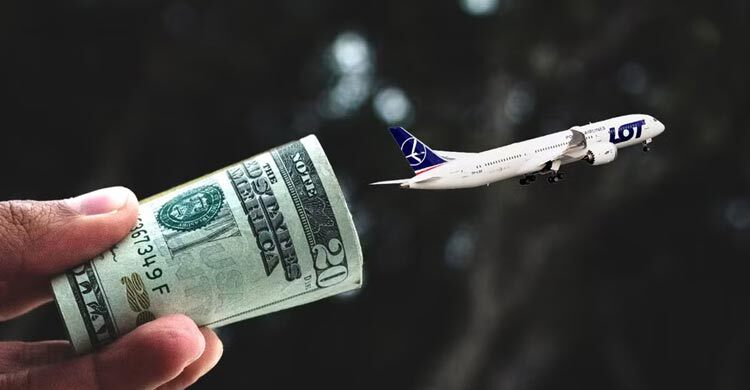Airfares in Bangladesh: 'Honey' in dollars, 'haggling' in taka

In most countries, airfares and cargo rates are pegged to local currencies, insulating passengers and businesses from exchange rate fluctuations. But in Bangladesh, Biman Bangladesh Airlines continues to set ticket prices in US dollars, a practice that has escalated travel costs by nearly 40% over the last four years.
Why fares are soaring
Four years ago, the dollar exchange rate in Bangladesh was Tk 80. Today, it has surged to Tk 120, directly impacting airfare costs. For instance, round-trip tickets from Dhaka to Malaysia that cost between Tk 25,000 and Tk 30,000 in 2020 now start Tk at 41,000. Similarly, fares to Kolkata, once Tk 6,000, have climbed to Tk 9,200.
This disparity is not only an economic burden but also creates inconsistent pricing. Passengers buying tickets from Dhaka pay higher fares due to the exchange rate, while those purchasing tickets abroad pay lower fares in dollar terms.
“Passengers are losing thousands of taka unnecessarily because fares are set in dollars. This practice undermines local purchasing power and creates discrepancies,” said Alamgir Hossain, owner of Travel Expert Aviation Services.
A call for reform
The Bangladesh Freight Forwarders Association (BAFA) and the Association of Travel Agents of Bangladesh (ATAB) have been vocal about ending this practice. They argue that setting fares in local currency would stabilise prices, enhance transparency, and align with global standards.
“In most countries, including neighbouring SAARC nations, airfares are quoted in local currencies. Bangladesh stands out as an exception,” said Kabir Ahmed, President of BAFA.
In 2023, the Ministry of Civil Aviation and Tourism issued directives for Biman to adopt local currency pricing.
However, implementation has been delayed repeatedly, with the latest deadline pushed to January 2025.
Business losses and dollar manipulation
Freight forwarders and travel agents allege that Biman benefits from fluctuating exchange rates. When the dollar weakens, the airline delays updating its exchange rate, earning extra revenue while increasing costs for businesses.
“For instance, if Biman sets the dollar at Tk 119.98 while the central bank rate is Tk 119, businesses lose nearly one taka per dollar. This hurts the freight sector and allows foreign airlines to dominate the market,” said a BAFA representative.
Impact on passengers and businesses
The dollar-based pricing is a double-edged sword, disproportionately affecting passengers and exporters. A Dhaka-Riyadh ticket priced at $500 now costs Tk 60,000, subject to daily exchange rate fluctuations. Exporters face similar challenges when booking cargo shipments.
“Every fluctuation means higher costs, and it’s the passengers and businesses who bear the burden,” said Abdus Salam Aref, President of ATAB.
Will change come?
Despite numerous appeals and government directives, Biman has delayed implementing local currency pricing, citing coordination challenges with the Ministry of Finance and other departments.
Biman’s General Manager, Bosra Islam, confirmed the January 2025 timeline for adopting taka-based pricing but evaded questions about alleged exchange rate manipulation.
While the move toward local currency pricing is a step in the right direction, the delays and resistance have frustrated industry stakeholders. “Passengers and businesses need relief now, not years later,” said a deputy secretary from the Ministry of Civil Aviation and Tourism.
The path forward
Switching to local currency pricing is more than just a policy shift—it’s an economic imperative. Aligning with global standards would make airfares predictable, reduce passenger costs, and level the playing field for local businesses.
For now, however, passengers and exporters remain at the mercy of dollar fluctuations and delayed reforms, hoping for tangible changes in 2025.

